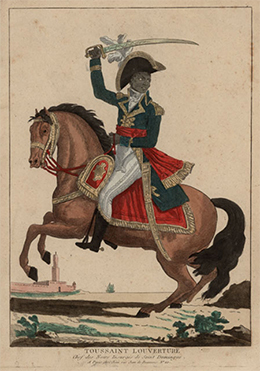| << Chapter < Page | Chapter >> Page > |
Jay’s Treaty confirmed the fears of Democratic-Republicans, who saw it as a betrayal of republican France, cementing the idea that the Federalists favored aristocracy and monarchy. Partisan American newspapers tried to sway public opinion, while the skillful writing of Hamilton, who published a number of essays on the subject, explained the benefits of commerce with Great Britain.
Unlike the American Revolution, which ultimately strengthened the institution of slavery and the powers of American slaveholders, the French Revolution inspired slave rebellions in the Caribbean, including a 1791 slave uprising in the French colony of Saint-Domingue (modern-day Haiti). Thousands of slaves joined together to overthrow the brutal system of slavery. They took control of a large section of the island, burning sugar plantations and killing the white planters who had forced them to labor under the lash.
In 1794, French revolutionaries abolished slavery in the French empire, and both Spain and England attacked Saint-Domingue, hoping to add the colony to their own empires. Toussaint L’Ouverture, a former domestic slave, emerged as the leader in the fight against Spain and England to secure a Haiti free of slavery and further European colonialism. Because revolutionary France had abolished slavery, Toussaint aligned himself with France, hoping to keep Spain and England at bay ( [link] ).

Events in Haiti further complicated the partisan wrangling in the United States. White refugee planters from Haiti and other French West Indian islands, along with slaves and free people of color, left the Caribbean for the United States and for Louisiana, which at the time was held by Spain. The presence of these French migrants raised fears, especially among Federalists, that they would bring the contagion of French radicalism to the United States. In addition, the idea that the French Revolution could inspire a successful slave uprising just off the American coastline filled southern whites and slaveholders with horror.
While the wars in France and the Caribbean divided American citizens, a major domestic test of the new national government came in 1794 over the issue of a tax on whiskey, an important part of Hamilton’s financial program. In 1791, Congress had authorized a tax of 7.5 cents per gallon of whiskey and rum. Although most citizens paid without incident, trouble erupted in four western Pennsylvania counties in an uprising known as the Whiskey Rebellion.
Farmers in the western counties of Pennsylvania produced whiskey from their grain for economic reasons. Without adequate roads or other means to transport a bulky grain harvest, these farmers distilled their grains into gin and whiskey, which were more cost-effective to transport. Since these farmers depended on the sale of whiskey, some citizens in western Pennsylvania (and elsewhere) viewed the new tax as further proof that the new national government favored the commercial classes on the eastern seaboard at the expense of farmers in the West. On the other hand, supporters of the tax argued that it helped stabilize the economy and its cost could easily be passed on to the consumer, not the farmer-distiller. However, in the spring and summer months of 1794, angry citizens rebelled against the federal officials in charge of enforcing the federal excise law. Like the Sons of Liberty before the American Revolution, the whiskey rebels used violence and intimidation to protest policies they saw as unfair. They tarred and feathered federal officials, intercepted the federal mail, and intimidated wealthy citizens. The extent of their discontent found expression in their plan to form an independent western commonwealth, and they even began negotiations with British and Spanish representatives, hoping to secure their support for independence from the United States. The rebels also contacted their backcountry neighbors in Kentucky and South Carolina, circulating the idea of secession.

Notification Switch
Would you like to follow the 'U.s. history' conversation and receive update notifications?